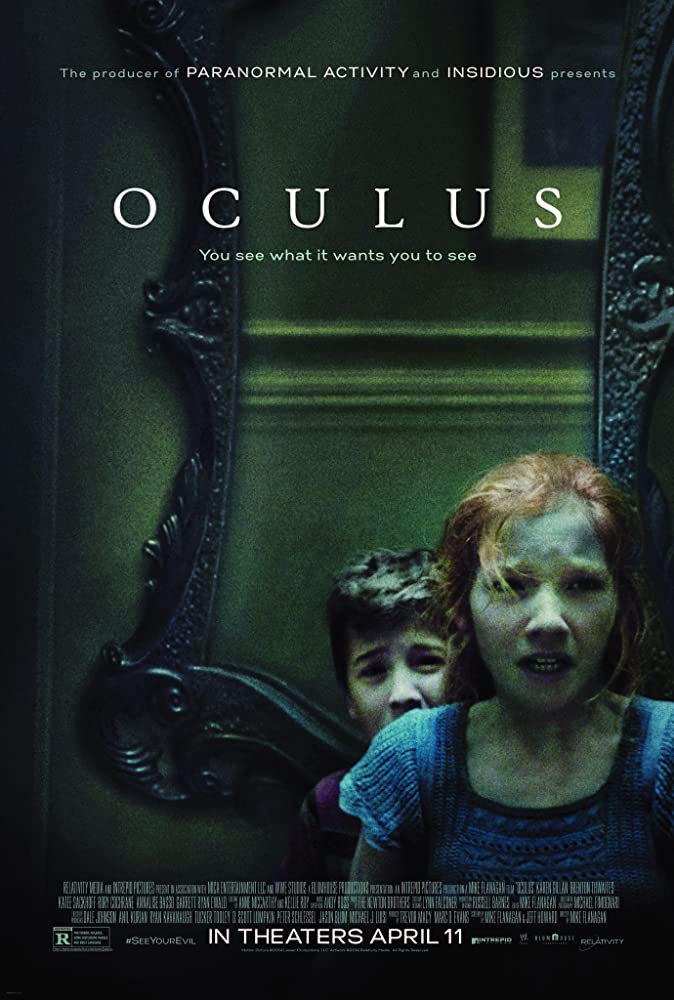Oculus is not your run-of-the-mill horror film filled only with jumpscares accompanied by loud, jarring sound effects. It is a wonderful blend of the supernatural and the psychological, leaving an indelible memory as one ponders endlessly on its story. While the trope of a haunted artifact possessed by a malevolent force may be overused, this film has added a twist of preying on the minds.
Set in the modern United States, the film has two plot lines that take place in parallel, the troubled childhood and the tormented adult lives of the siblings — Tim and Kaylie Russell. Viewers can expect a sublime performance from Brenton Thwaites and Karen Gillan as the adults and Garrett Ryan Ewald and Annalise Basso as the children.
First, viewers are introduced to the accursed mirror when Alan Russell, the father (Rory Cochrane), purchased it innocuously for his home office. A seemingly ornamental mirror, the intricate antique holds a mysterious power that induces hallucinations. Marie, the wife (Katee Sackhoff), was driven insane by the phantasm that she believed her husband was cheating on her with. The loving family spiralled quickly and both parents became demented under the insidious influence. The slow decay of the human minds is perhaps the scariest of all horror elements.
Oculus then pans to the current year, 2013, after the siblings’ innocent childhoods ended abruptly. Alan had murdered Marie, prompting Tim to protect his sister and himself by pulling the trigger reluctantly on their father. Next, viewers are shown the adult Tim who is discharged after years of receiving psychiatric treatments in a mental facility. No longer believing in the supernatural events that had unfolded, the physicalist Tim was finally reunited with his older sister.
Kaylie, however, has spent much of her life researching on the mirror to exonerate her brother. Adamant and a little obsessive, Kaylie has finally gotten her hands on the mirror once again despite Tim’s apprehension. Tim’s attempt to erase those bitter memories, believing the supernatural to be an effect of his mental illness, in my belief, is his innermost desire to get back to their happier days.
Kaylie eventually convinced Tim to assist her, striving to document the entity using various high-tech equipment to find justice for their family’s demise. They return to their old house with the mirror, and predictably, everything has gone wrong. The reappearance of the same disconcerting ghosts accompanied by spine-chilling sound effects, the outcome is pretty much slated in stone.
Kaylie’s meticulous plans with the technology on hand are triumphed by the mirror yet again. The sibling’s minds are influenced, behaving erratically as they could no longer believe what they saw. Trapped in the nightmares of their younger days, Tim and Kaylie are forced to relieve the pain over and over again, haunted by beckoning spectres. In the end, the pain finally ends when Tim killed the sister he had so desperately tried to protect in a mishap. And as the story repeats, Tim is taken away for a crime he had guiltlessly committed.
Oculus has done very well in the theatres, receiving generally positive reviews despite its small budget. The use of only a haunted object and focusing on the tales of the two characters, Oculus has succeeded in amplifying their psychological fears while playing with ours as well.
The minds are fragile, as the director Mike Flanagan put prominence on, unnerving the mental, emotional, and psychological states leaves a much deeper scar than the physical one. Leaving the viewers a perpetual state of unrest throughout the entire film, whether in the past or present scenes, I had indeed felt the same dread as the characters. “Why don’t you believe in Tim?” I wondered, “The mirror’s powers are real, Tim did not commit the crime!” The impending doom and the isolation the characters felt, especially Tim, was almost palpable.
Ultimately, one may argue that the mirror is a mere object, the only supernatural events that occurred were all along in the mind. Was the father truly under the control of a phantom force or was it due to his lapsing lucidity? Was the mother genuinely delusional due to the strains of their marriage? Perhaps Tim had fallen prey to his mind as well, was it really the mirror behind the violence and blood?
In Oculus, the horror is simple and deeply rooted, preying on our darkest fear — the insecurity of self. While many may contend the possibility of the unknown, this film with its ambiguity leaves much to debate and think upon the truth of our version of reality.
Oculus has successfully played with the minds of Tim and Kaylie, and in turn, ours.













